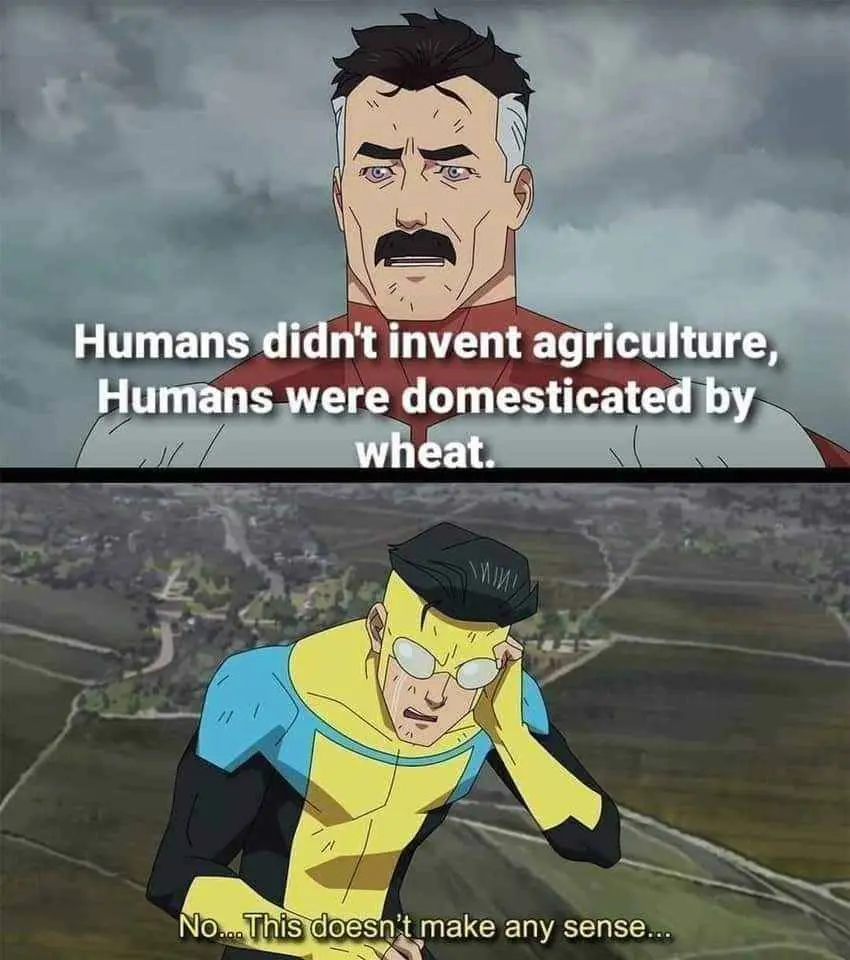I mean, the Roman Empire was an olive tree superorganism. Prove me wrong.
Science Memes
Welcome to c/science_memes @ Mander.xyz!
A place for majestic STEMLORD peacocking, as well as memes about the realities of working in a lab.

Rules
- Don't throw mud. Behave like an intellectual and remember the human.
- Keep it rooted (on topic).
- No spam.
- Infographics welcome, get schooled.
This is a science community. We use the Dawkins definition of meme.
Research Committee
Other Mander Communities
Science and Research
Biology and Life Sciences
- [email protected]
- [email protected]
- [email protected]
- [email protected]
- [email protected]
- [email protected]
- [email protected]
- [email protected]
- [email protected]
- [email protected]
- [email protected]
- [email protected]
- [email protected]
- [email protected]
- [email protected]
- [email protected]
- [email protected]
- [email protected]
- [email protected]
- [email protected]
- [email protected]
- [email protected]
- [email protected]
- [email protected]
- !reptiles and [email protected]
Physical Sciences
- [email protected]
- [email protected]
- [email protected]
- [email protected]
- [email protected]
- [email protected]
- [email protected]
- [email protected]
- [email protected]
Humanities and Social Sciences
Practical and Applied Sciences
- !exercise-and [email protected]
- [email protected]
- !self [email protected]
- [email protected]
- [email protected]
- [email protected]
Memes
Miscellaneous
I am pretty sure they were sentient, rotting fish guts.
While I wouldn't say that's right, I also wouldn't come right out and call it wrong either. This very much engages with the "Selfish Gene", an heuristic model of thinking about evolution from the perspective of the gene itself instead of populations.
As an added amusement, the book "The Selfish Gene" came out in 1976, and is the source of the word "meme," used somewhat differently than it is now, naturally.
Makes total sense: who's working for whom? Is wheat making an effort to till the soil and find fertiliser to help us grow, or is it the other way round?
And here we have a typical specimen exhibiting capitalist realism: Observe how the subject is analysing everything they come across on a "who works for who" basis, projecting human modes of production onto the universe. Applying it, even in vain, this reductive universality ensures that they will never think beyond it and, not thinking beyond it, not question either working for a capitalist or being a capitalist who is worked for, thereby in either case working for capitalism, a form of human cooperation in which happiness, well-being, yes even human connection (that necessitating eye-level communication) is traded for hastened advancement of the economy to achieve post-scarcity.
9 points out of 10, very good. Except that capitalism doesn't want to ever achieve post-scarcity. They're a dog chasing a car, without scarcity and demand their profit streams dry up.
Hence why post-scarcity is the natural death point of capitalism.
Your question is essentially the same as Freudians arguing among themselves about the existence of a death drive: How could it possibly benefit the individual? If it can't in some way benefit the individual, how can it be a drive? How does it mesh with the pleasure principle? The answer is simple: It doesn't benefit the individual. In certain circumstances it benefits the genome, that's why us seed-pods can, in certain circumstances, enter states in which it is pleasurable.
And all-encompassing and all-powerful, indeed, religious, as capitalism may seem right now it, too, is a seed pod. It does not have to will its abolishment to bring about the material conditions abolishing it.
Of course there's also nothing speaking against it not making things unduly nasty for us. But that's mere politics, not fate.
- Beer
We have been played for absolute fools
Omni-Man's red eyes make him look blazed, which fits what he's saying pretty well. "Dad, what the hell are you talking about?"
Deleted
I so want to befriend my local crows, been meaning to buy some seeds for bribing them
There's some magpies near me, but I don't have a predictable enough routine to befriend them. I had some crow friends once and they would knock on my window when I was late coming out to them.
I wonder what kind of cats rich people tend to go for. Like, say, it's some kind of black long haired green eyed mini cat. It'll receive better healthcare than most humans on earth.
It really is a symbiotic relationship we've developed with the things we've domesticated (or that domesticated us)
Especially animals reserved for working instead of eating, because in those situations oftentimes the food being made with the work is shared between the symbiotes.
I would say it's symbiotic to the continued survival and propegation of their genes, but not to their well-being as individuals.
It's also a double-edged sword. The moment a domesticated species isn't useful enough for us, its numbers (and therefore genes) will decrease dramatically. Plenty of livestock populations may be reduced to a tiny size if artificial meat production becomes cheap enough, or if it's decided to be a necessity to fight climate change.
Yeah, influence is rarely a one way street and things like agriculture or animal husbandry have definitely changed us as well
How to tell someone is reading Sapiens.
Still, insane that "science/technology improvements" did not improve happienes at all. Just shifted the standards.
